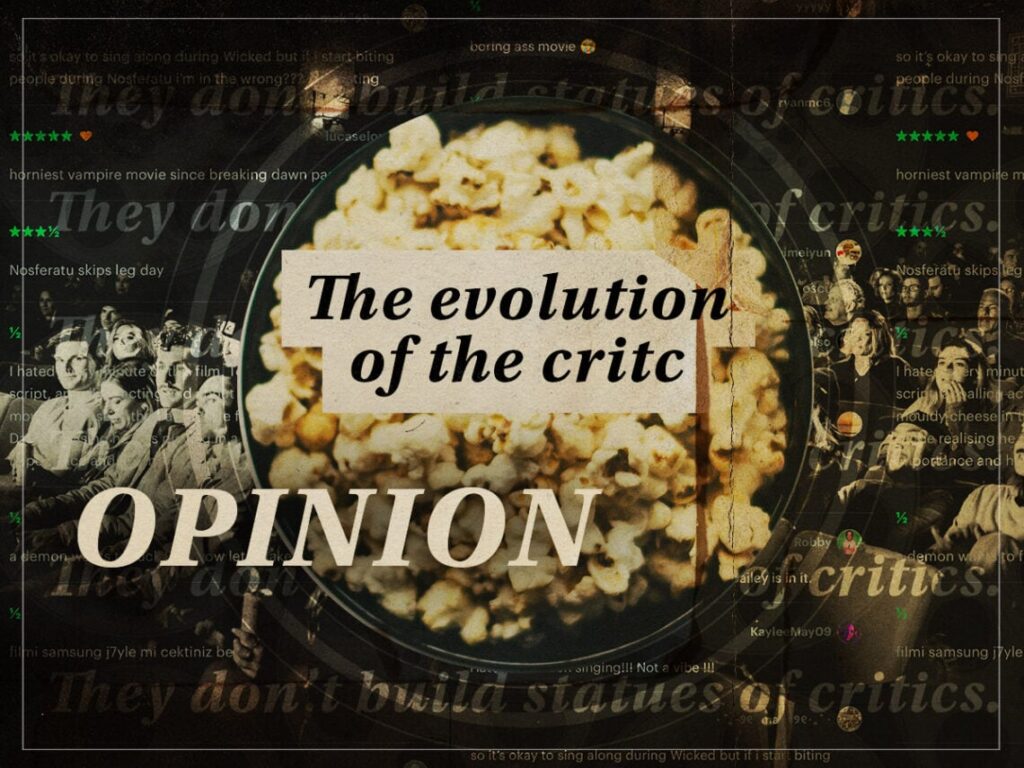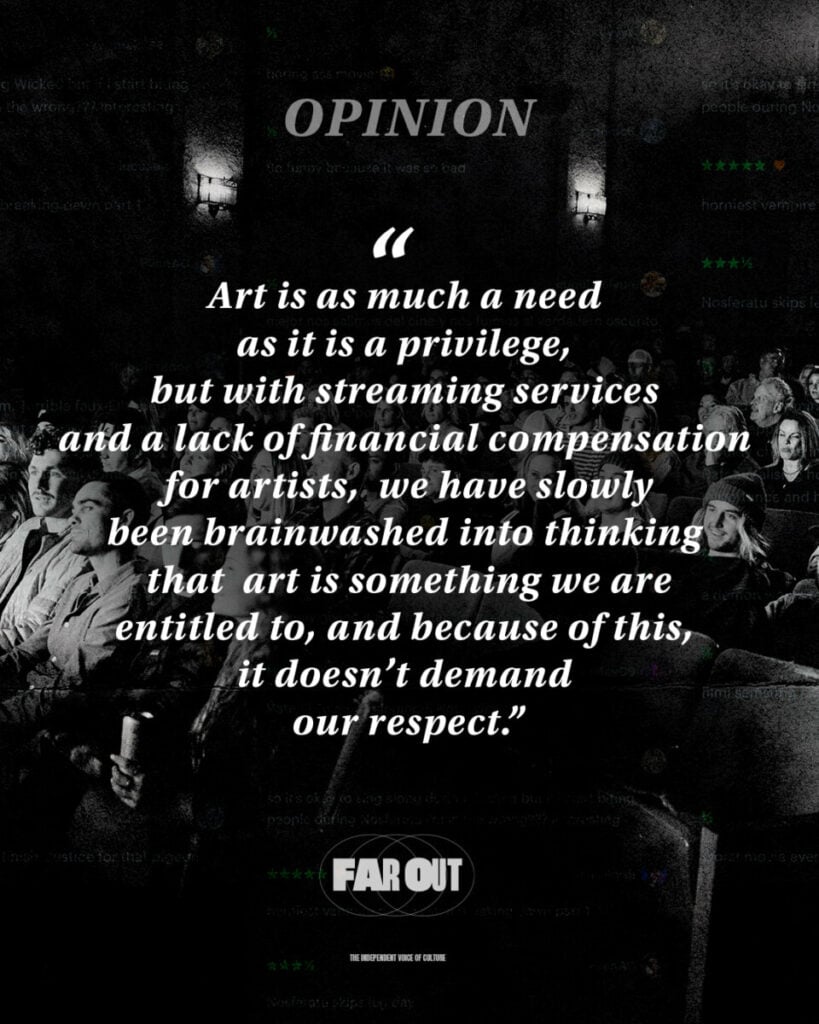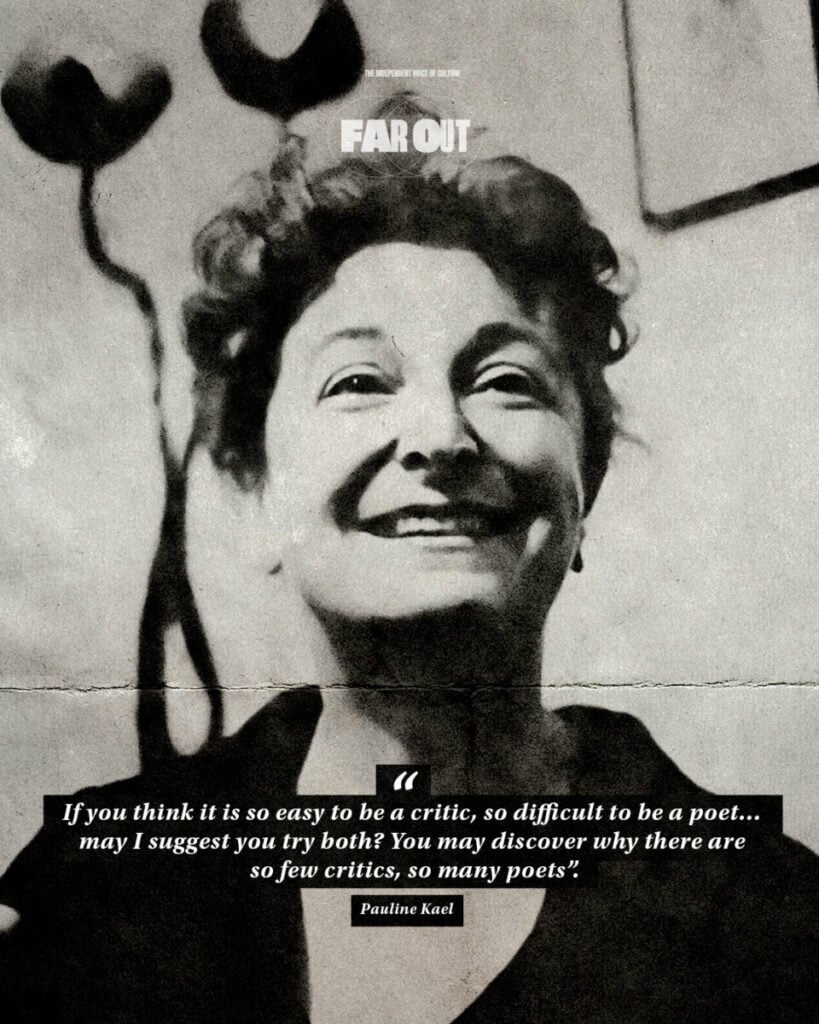The evolution of the critic: Has internet culture killed art and critical thinking?
 Posted On
Posted On
(Credits: Far Out)
These days, everyone is a critic. Everyone on Instagram is a fashion expert, everyone with a notes app is a writer, and everyone on Letterboxd is a film critic. We love to tear down the things we hate and reluctantly award praise to the things we love, with a mean streak becoming evident in everyone as soon as something is widely disliked. I am guilty of this, too, and everyone is somewhat involved in this endless chain of criticism and opinion-sharing.
But in recent years, it feels as though there has been a resurgence in hatred towards the official role of the critic, with some deeming it an unnecessary position that is no longer relevant when so many people can share their timely thoughts about the media they love and hate. Artists have responded to criticism with the infamous line, “People don’t build statues of critics”, with the saying doing another loop through popular culture after Charli XCX adorned a T-shirt with the slogan.
While some may perceive this as a slight and harmless jibe, it does raise larger questions about the purpose of critics in the modern world. When everyone has something to say, where does it leave the future of this role? And does anyone really care what the critics have to say?
Conversations about the effect of social media on the creative industry can sometimes feel repetitive and boring. I get it. The internet has been both beneficial and incredibly harmful for artists. But, when discussing the role of the critic, I believe that it has been uniquely harmed by this phenomenon. We now live in an age where anyone can have a voice, and a general level of narcissism has been normalised and encouraged on the internet, with too many people believing that every opinion, outfit and experience should be shared and publicised. There is no such thing as an inner world, and people will gladly exploit their private lives to gain attention and clout online, with very little defining the separation between private and public selves as everything merges into one self-indulgent melting pot.
The creation of sites such as Instagram and X (Twitter) have exaggerated our perception of our own importance, with uneducated people believing themselves to be equally knowledgeable as scientists on areas of their expertise, claiming that they are reliable sources on matters such as climate change because they have done their ‘own research’. The same goes for medicine – doctors are now battling against swarms of patients who have googled their symptoms and believe they are correct in their own self-diagnosis despite having spent approximately zero years at medical school.

This delusional cloud of narcissism has convinced people to think that every voice carries the same weight, when obviously, if you have a professional speaking about something, it should bear more importance. If Mary Berry were to advise about baking, I would be more inclined to listen to her opinion than that of someone who had never baked but instead watched The Great British Bake Off.
But when it comes to art, film and music critics are often silenced by the phrase, “art is subjective!” But is it really? While your emotional response to it certainly is, the art form has objective elements to it. For example, I enjoyed Wicked, but I wouldn’t consider it a serious candidate for an Oscar because, objectively speaking, the lighting was complete balls. You can’t compete when you don’t compare.
But alas, there will be hoards of Wicked fans who will inevitably descend onto social media platforms after the nominations are announced, claiming that it was ‘snubbed’ of critical recognition. Or, given the current state of the Oscars, perhaps it will end up winning ‘Best Picture’. But the Academy isn’t made up of critics, just biased old men who will vote for whatever is most commercially popular or will earn Hollywood some brownie points after being accused of white-washing (again).
And this leads us back to art critics. Platforms have been created with the sole purpose of sharing opinions on books and films, with sites like Letterboxd sweeping the internet, allowing anyone to write about their thoughts on what they’ve watched. Now, don’t get me wrong, I love this website, and there is nothing harmful about people sharing their love for cinema – it’s generally quite lovely and highlights the strength of community among cinephiles.
However, the existence of these sites can dilute the level of engagement with a work and any meaningful analysis, with many users opting for light-hearted comments and jokey one-liners when discussing a film. It goes without saying that not everyone needs to respond to the media they consume in a nuanced way, but when we combine the rise of this blasé approach with the declining respect towards professional critics and a scarily common lack of critical thinking on the internet, it means that there are very few people engaging with the medium in a critical way. As well as this, those who are experts are often labelled as being pretentious, almost being shamed for having an understanding of the medium they specialise in. There are endless comments on the Letterboxd four-favourites videos as fans berate filmmakers and actors for choosing films they haven’t heard of, labelling industry titans as pretentious for citing a John Cassavetes film as an influence on their craft. Somehow, scientists aren’t labelled as such when sharing insights into their work, but when it comes to artists, there are some people who seem almost angry at detailed discussions of the medium. And here’s why this is detrimental.
When surface-level responses to art are normalised and everything else is labelled as ‘pretentious’, it means there are fewer people dedicating time and thought to analysing the intentions and achievements of the artist. An appreciation of the arts is seen as futile because ultimately, many people don’t see it as a medium that requires expertise or deserves respect, because it’s not that serious. It’s all objective. And if that’s the case, then everyone is an expert. Any man in his twenties who has seen Pulp Fiction is basically a film critic.

It goes without saying that an incredible amount of work goes into creating a film, and it seems a waste if no one engages with the work in a way that reflects your direction of it. Imagine you are a filmmaker, and you just made a film that you believe has many layers and nuanced depths, only you live in a world in which the only feedback you receive is when logging onto Letterboxd and reading countless comments that say, “this happened to my buddy Eric”.
Forgive the example, but you understand what I’m getting it. I recently watched a film in which I was disappointed to only find extremely reductive and dismissive comments on Letterboxd, and the only way I could find a decent analysis of it was by reading an essay by a critic whose work I admire. Without this, the movie would have been washed in a wave of vaguely insensitive jokes (given the weight of the subject matter) and not a single thought devoted to understanding the complex undercurrents of the narrative, completely disregarding the care dedicated by the director in conveying this.
Our lack of understanding and respect for the critic’s role reflects our lack of respect for the arts in general. Art is as much a need as it is a privilege, but with streaming services and a lack of financial compensation for artists, we have slowly been brainwashed into thinking that art is something without value that we are entitled to, and because of this, it doesn’t demand our respect. Films are squeezed into reductive packages and sold as products, with some of the most talented modern directors being used as pawns by the industry to earn a quick buck, with bold and creative voices being reduced to their commercial possibility and told that this is more important. Barry Jenkins is directing a live-action Lion King sequel for Disney. Authenticity is irrelevant, money reigns all, and money corrupts the meaning of everything.
With the rise of social media culture, online narcissism, the declining respect for the arts as a result of funding cuts and creativity being funnelled through capitalist machines, we have reached a place in which everything and nothing is serious. Our opinion means everything, and if we can’t understand something, then it must be meaningless. And because we’re all critics, then we can justify the opinion that it doesn’t have meaning. There are some people on the internet cannot discern their ass from their elbow when critically engaging with a piece of media because we’ve been tricked into thinking that everything is objective and everyone is equally informed on the subject. But if no one is giving the work the respect and thought it deserves, then it becomes meaningless, just like everything else on the internet.
Pauline Kael once said, “If you think it is so easy to be a critic, so difficult to be a poet… may I suggest you try both? You may discover why there are so few critics, so many poets”. While it is easy to share a quick response to something you enjoyed, and there is no harm in doing so, the role of the critic is vital in reinforcing the importance of art in general: to sit with the ideas that are carefully presented and to unpack its meaning, and without this, the choppy waters of mass opinion become the only form of engagement, and our interaction with art grows in superficiality until we lose sight of its value entirely.
[embedded content]
Related Topics


